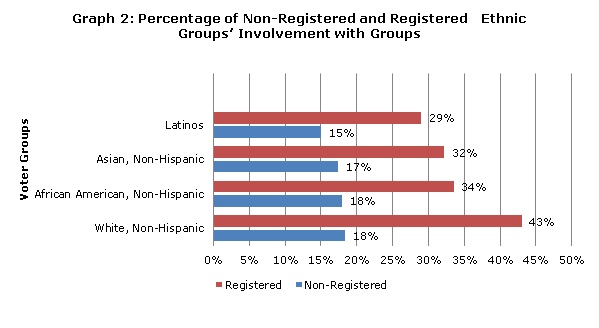Civic Engagement among Registered Citizens and Non-Registered Eligible Citizens
Recently, we received a question regarding the political and civic engagement of registered versus non-registered citizens. Based on statistics from the November 2010 Current Population Survey, we found that generally, eligible registered voters are more likely to engage in various civic and political activities than those who are not registered.
For instance: those who are registered are more likely to engage in the following ways:
Data suggests that registered voters, overall, are more strongly connected with their neighbors and family members. They are more likely to discuss political issues with family or do favors for their neighbors, compared to non-registered voters.
Contrary to this, both registered and non-registered citizens have connected over the internet at similar rates (58.5% and 46.8%, respectively). The internet has been and may continue to be used as a tool to connect people who are otherwise disengaged.
Furthermore, when looking at the data, one can see that White eligible citizens have the highest percentage of being involved with any sort of group regardless of registration status (especially registered voters). African Americans and Asians have very similar percentages of both voter groups. Latinos have the lowest rates of group involvement regardless of voter registration.
One particular point of interest is the percentage gap in overall involvement with groups between eligible registered Whites and Latinos. . White Registered voters are more likely to engage through community groups than Latino registered voters, by roughly a ten-point margin.
Married individuals are more involved with civic activities and groups than unmarried individuals or people of or other marital status. Single/ never married registered voters are the least likely to participate in groups in their communities. . Married individuals may become involved through their spouse/partner’s activities. Another possibility is that these two marital status groups are most likely to have children and are often involved with school activities.
Examining the differences of civic activities between registered and non-registered voters is important to civic engagement research because it allows us to see where there are gaps in opportunities for various groups. For example, why is there a significant gap between registered White and Latino voters? Are there not enough opportunities for civic participation for single-never married voters? These questions allow community organizers and civic organizations to see which groups of people are falling through the cracks, and what efforts can be made to prevent it. This information is also important in that it shows that among the general population, people who are participating in electoral participation are more likely participating in other ways as well.
— Whitney Henderson









May 4th, 2012 at 1:48 pm
Illinois Issues magazine based at the University of Illinois Springfield is publishing a new edition of the textbook, Governing Illinois, aimed at students junior high to college sophomore. We would like to use a graphic illustrating a voting pattern from a recent election. I think the graph on the previous page showing registered and nonregistered voter participation would work, unless you could point us to a graphic that would better grab youth interest. We have a designed space of one vertical column.
January 3rd, 2014 at 9:10 am
[…] is part of a larger movement within the nonprofit sector, recognizing the many benefits of voting. Registered voters are six times more likely to contact or visit a public official and three times mo… Additionally, voting is linked to higher levels of self-reported health and lower recidivism rates […]